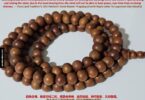念经和念佛有什么分别?
How Does Recitation Of Sūtras Differ From Recitation Of The Buddha’s Name?
Question: How is recitation of the Amitā[bha] Sūtra《阿弥陀经》(念经) different from recitation of Amitā[bha] Buddha’s name (阿弥陀佛: Āmítuófó) (念佛)?
Answer: The Pure Land scriptures (净土经), such as the Amitābha Sūtra, serve to introduce Amitābha Buddha (as the principal Buddha [佛]), the related Pure Land teachings (as the principal Dharma [法]), and the Pure Land’s noble assembly (as the principal Saṃgha [僧]) to us. Together, they form the Pure Land’s Triple Gem (三宝), that Pure Land practitioners take particularly focused refuge in.
The sūtra also guides us to give rise to the Three Provisions (三资粮) for birth in the Pure Land. As the key Dharma Door (法门) for reaching the Pure Land, the Main Practice (正行) of mindfulness of Buddha (念佛) in terms of Āmítuófó’s name was instructed. This means recitation of sūtra(s) (念经) and all other practices are considered as Supportive Practices (助行), secondary to the primary practice of mindfulness of Buddha.
With the Main and Supportive Practices clear in terms of priority, the most time and efforts should be spent on the Main Practice of mindfulness of Buddha, in everyday life, when dying and after death (if not yet reborn). Recitation of the Amitābha Sūtra is for deepening understanding of the Pure Land teachings, while recitation of Āmítuófó’s name is to ensure that his Pure Land can be reached.
A suggested ratio, for ‘Supportive Practices : Main Practice’, is 1:3, with three-quarters of one’s time and efforts spent on mindfulness of Buddha. For busy practitioners, even if there are not many Supportive Practices, there should be still be ample Main Practice in everyday life, as without it, they would be as if with no practice at all. A suggested time duration is 15 to 30 minutes. For those old and sick, there should be even more practice, as time is running out.
相关文章
Related Articles:
念佛比念经好吗?
Is Niànfó Better Niànjīng?
https://purelanders.com/2012/06/25/is-nianfo-better-than-nianjing
死亡前后与丧礼中后的诵念
What To Chant When Dying, After Death, During And After Wakes
https://purelanders.com/wake





